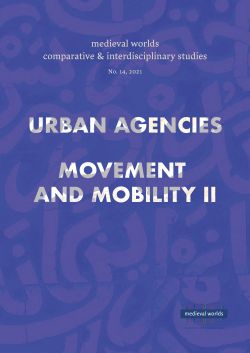 |
 |
Walter POHL – Andre GINGRICH (Eds.)
medieval worlds • no. 14 • 2021
Alaric Hall,
Shamira A. Meghani
S. 265 - 288 doi: 10.1553/medievalworlds_no14_2021s265
Verlag der Österreichischen Akademie der Wissenschaften doi: 10.1553/medievalworlds_no14_2021s265
Abstract:
While early medieval riddles in Old English and, to a lesser extent, Latin, have been studied extensively from ecocritical perspectives in recent years, the large corpora of riddles in other languages of western Eurasia have yet to benefit from or feed back into these methodological developments. Meanwhile, ecocritical research generally has focused on animals at the expense of plants. We respond to both problems by providing the first extensive study of riddles whose solutions are plants, through the lens of one recurrent conceit in ancient and medieval verse riddles in Arabic, Greek, Latin, Old Norse and, we argue, Hebrew. The conceit is that a plant is a virgin woman who nevertheless reproduces. By examining different permutations of this motif, we show how these riddles use plants to comment on human gendering, and how, while usually fundamentally patriarchal in their world-views, they register patriarchal anxiety at women’s reproductive capabilities, acknowledge critiques of patriarchal constraints on women, and queer gender norms in other ways; inter alia we note that the Old Norse riddle studied here may be the only explicit (albeit metaphorical) representation of female homosexual eroticism in the Old Norse corpus. However, we also draw on critical plant theory to explore how the riddles situate plants in medieval Abrahamicate cultures, uncovering implicit recognitions of the dynamic and reciprocal relationships between human farmers and their family structures, the plants that domesticate them, people’s and plants’ mutual shaping of the ecosystems they inhabit or colonise, and the economies that these interactions constitute.
riddles, critical plant theory, Abrahamicate, ekphrasis, Dunash ben Labraṭ ha-Levi, Heiðreks saga, ecocriticism, sexuality Published Online:
2021/12/01 11:10:09 Object Identifier:
0xc1aa5576 0x003d0818
Rights:All rights reserved.For questions regarding copyright and copies please contact us by email.
medieval worlds provides a forum for comparative, interdisciplinary and transcultural studies of the Middle Ages. Its aim is to overcome disciplinary boundaries, regional limits and national research traditions in Medieval Studies, to open up new spaces for discussion, and to help developing global perspectives. We focus on the period from c. 400 to 1500 CE but do not stick to rigid periodization.
medieval worlds is open to submissions of broadly comparative studies and matters of global interest, whether in single articles, companion papers, smaller clusters, or special issues on a subject of global/comparative history. We particularly invite studies of wide-ranging connectivity or comparison between different world regions.
Apart from research articles, medieval worlds publishes ongoing debates and project and conference reports on comparative medieval research.
Urban Agencies: Reframing Anatolian and Caucasian Cities (13th-14th Centuries)
Guest Editors: Bruno de Nicola and Matthew Kinloch
Preface
Matthew Kinloch and Bruno de Nicola
Reframing Medieval Anatolia, Caucasia, and the Aegean: Narratives, States, and Cities
Matthew Kinloch
Urban Agency and the City Notables of Medieval Anatolia
A. C. S. Peacock
Cities and Imperial Authority in the Western Provinces of the Byzantine Empire, 12th-14th Centuries
Teresa Shawcross
A Conceptual Account of Market Morals that Resonated in Medieval Anatolia under Christian and Muslim Rule
İklil Selçuk
Merchant Capital, Taxation and Urbanisation. The City of Ani in the Global Long Thirteenth Century
Nicholas S. M. Matheou
Looking for Urban Agency in a City of Memorials: Tomb Towers of Late-Thirteenth-Century Ahlat
Oya Pancaroğlu
Urban Agency in the Borderlands: Turkmen Rulers and Administrative Elites in 13th-century Kastamonu
Bruno De Nicola
“These are the narratives of bygone years”: Conquest of a Fortress as a Source of Legitimacy
Dimitri Korobeinikov
Movement and Mobility in the Medieval Mediterranean:
Changing Perspectives from Late Antiquity to the Long-Twelfth Century, II
Guest Editors: Christopher Heath, Clemens Gantner and Edoardo Manarini
The Sicilian Tithe Business: State and Merchants in the Eleventh-Century Islamic Mediterranean
Lorenzo M. Bondioli
"Eager to Go to the Desert": Ambiguous Views on Ascetic Women’s Holy Travels in Late Antiquity
Andra Jugănaru
Where the Long Way Ends: Descriptions of the Mediterranean Sea and Holy Land and the Criticism of Crusading at the Court of Henry II of England (1154-1189)
Fabrizio de Falco
Individual Articles
"I am a virgin woman and a virgin woman’s child". Critical Plant Theory and the Maiden Mother Conceit in Early Medieval Riddles
Alaric Hall and Shamira A. Meghani
Latin and Hebrew Analogues to The Old Norse Leek Riddle
Alaric Hall
|




 Home
Home Print
Print
 References
References
 Share
Share
